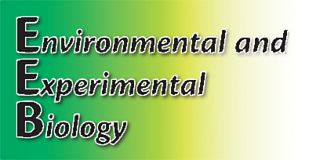
On-line: ISSN 2255–9582

| Faculty of Biology, University of Latvia | ||||||

|
Hard copy: ISSN 1691–8088
On-line: ISSN 2255–9582 Environ Exp Biol (2021) 19: 255–263
|
|||||

|
About the Journal | Retractions | Open Access | Author Guidlines | Current Issue | Archive |
|
Environmental and Experimental Biology |
Environ Exp Biol (2021) 19: 255–263 |
There is an urgent need to find new ways to fight multidrug-resistant pathogens, and search for novel microbial metabolites is one of the common strategies. The aim of the current study was to screen actinomycete isolates from a marine-associated ecosystem, for active compounds against multidrug-resistant human pathogens. A total of 14 morphologically distinct isolates from coastal mangrove soil were screened against seven pathogens and were found to be active against at least two pathogens. The antagonistic metabolite production studies revealed that the initial antibacterial activity of isolates against methicillin-sensitive and resistant strains of Staphylococcus aureus was observed on the first day of visible growth. Two strains, ICN937 and ICN938, were active against Acinetobacter baumannii, and were selected for further molecular identification and quantitative antibacterial analysis. Phylogenetic analysis based on 16S rRNA showed association of ICN937 to Streptomyces antibioticus NBRC 12838T and of ICN938 to Streptomyces rubiginosohelvolus CSSP731T. This study provides an evidence that mangrove ecosystems in coastal areas could be used as a source for active microbial metabolite producers.